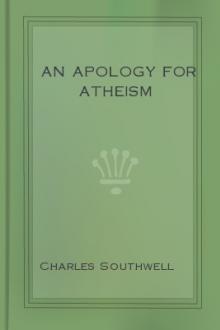Genre Philosophy. Page - 5
No registration or authorisation! And it is all for free!

rights, or, what is equal, that' knowledge which would infallibly secure them. The Methodist preacher, who has the foolish effrontery to tell his congregation 'the flesh lusteth always contrary to the spirit; and, therefore, every person born into the world deserveth God's wrath and damnation,' may be a liberal politician, one well fitted to pilot his flock into the haven of true republicanism: but the author is extremely suspicious of such persons, and would not on any account place his

nd unimportant compared with the agreements; and he has not only enriched the exposition by many applications and illustrative details, but has appended to it a minute and very valuable discussion of the logical principles specially applicable to each of the sciences--a task for which the encyclopedical character of his knowledge peculiarly qualified him. I have in several instances made use of his exposition to improve my own, by adopting, and occasionally by controverting, matter contained in

of sense is but a small part of the pleasure he actually experiences.That pleasure, as a whole, is a highly complex thing, and rests mainlyon a basis that, by a little knowledge, could be annihilated in amoment. Tell the boy what the champagne really is, he has been praising;and the state of his mind and face will undergo a curioustransformation. Our sense of the worth of life is similar in itscomplexity to the boy's sense of the worth of his wine. Beliefs andassociations play exactly the same

g with these propositions the description of creation in that treatise, one may indeed see that what is called divine providence is government by the Lord's divine love and wisdom. In that treatise, however, creation was the subject, and not the preservation of the state of things after creation--yet this is the Lord's government. We now treat of this, therefore, and in the present chapter, of the preservation of the union of divine love and wisdom or of divine good and truth in what was

r with nine inconveniences and mischiefs that attend those churches where unity and peace is wanting.IV. And, lastly, I shall give you twelve directions and motives for the obtaining of it. 1. As touching the sense of the text, when ye are counselled to keep the unity of the Spirit, we are not to understand the Spirit of God, as personally so considered; because the Spirit of God, in that sense, is not capable of being divided, and so there would be no need for us to endeavour to keep the unity

be upon him unless a remedy be found, is compelled to seek a remedy with all his strength, inasmuch as his whole hope lies therein. (7:3) All the objects pursued by the multitude not only bring no remedy that tends to preserve our being, but even act as hindrances, causing the death not seldom of those who possess them, [b] and always of those who are possessed by them.[8] (1) There are many examples of men who have suffered persecution even to death for the sake of their riches, and of men who

g by With trampling feet of horse and men: Empire on empire like the tide Flooded the world and ebbed again;A thousand banners caught the sun, And cities smoked along the plain, And laden down with silk and gold And heaped up pillage groaned the wain. Kemp. * * * #The Priestly Lie# When the first savage saw his hut destroyed by a bolt of lightning, he fell down upon his face in terror. He had no conception of natural forces, of laws of electricity; he saw this event as the act of an individual

rld." It will thus be seen that the uncertain and unsatisfactory condition of psychics is shared also by other branches of scientific investigation, and it is as yet too soon to say whether or not the ultimate verdict will swing in this direction or in that. We can only hope, and continue to experiment!5. Psychical research, therefore, may continue to progress, in spite of the innate difficulties and the obstacles with which the subject is surrounded. It is our duty to see that it does!

Eleatics. For of all the pre-Socratic philosophers, he speaks of them with the greatest respect. But he could hardly have passed upon them a more unmeaning slight than to ascribe to their great master tenets the reverse of those which he actually held.Two preliminary remarks may be made. First, that whatever latitude we may allow to Plato in bringing together by a 'tour de force,' as in the Phaedrus, dissimilar themes, yet he always in some way seeks to find a connexion for them. Many threads

to-day, it leads an historical life, striding onward in thepath of progress without stay or interruption. Deprived of politicalindependence, it nevertheless continues to fill a place in the worldof thought as a distinctly marked spiritual individuality, as one ofthe most active and intelligent forces. How, then, are we todenominate this omnipresent people, which, from the first moment ofits historical existence up to our days, a period of thirty-fivehundred years, has been developing